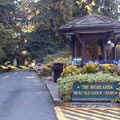|
By Jackie Alan Giuliano, Ph.D.
Lack of contiguous access to natural areas affects much more than recreational needs. The forests and ecosystems of the world are becoming increasingly fragmented. Private property purchases are creating tiny islands of nature that often cannot exist on their own.
Wildlife biologists fear that the breakup of habitats into small, isolated patches are often too limited to maintain a species. Fragmentation also results in more edges to the property and these edge habitats are often unhealthy for life. These edges expose an area to weather that the ecosystem was not designed for and the additional sun, wind, and rain is often detrimental.
In Seattle, it is very difficult to find open stretches of beach or forestland. Choice views of Puget Sound, Lake Union, and Lake Washington are available from only a few parks in town. But since 1907, hundreds of acres of forest have been off limits in a gated community known as The Highlands. Located about 15 minutes north of the city, The Highlands has been the home of families with old money such as the Boeings and the Nordstroms. Designed in 1907 by the Olmstead brothers, who also designed other parks in town, it is off limits to all but residents.

Gatehouse, The Highlands (Photo c Jackie Giuliano)
When we first moved to Seattle, my family and I thought we would drive to The Highlands. The map we had only showed the vast forest and coastal vistas of the region. When we arrived - the entrance is only 10 minutes from my house - the armed guard at the gate changed our plans.
The Wyoming Wildlife Federation says that in their home state, some private landowners intentionally buy up private lands surrounding vast tracks of public land, and then deny access to the public. There have been cases where the public land is then turned into a private hunting preserve and marketed by boasting of its remoteness and lack of other hunters or hikers.
The Texas Water Resources Institute reports that few people can get to its many rivers, since most of the riverbank property is under private ownership.
Private organizations like the Nature Conservancy will use donated funds to purchase unique tracts of land and protect them from development. The public is often given access to these lands, but the Conservancy can only afford to protect the truly special and unique.
California has aggressively addressed this issue with the California Coastal Act. The Coastal Act mandates that development not interfere with the public's right of access to the coastline. Yet homeowners still try to claim the beaches for their own.
The U.S. government began to address this issue years ago. The National Oceanic and Atmospheric Administration has an Office of Ocean and Coastal Resource Management that addresses public access. They say that over 180 million Americans visit the coast each year, many of whom can't find access.
Some property owners attempt to provide access, but most do not. These affluent property owners are powerful, often commanding the ear of local government officials. Many have banded together in organizations, such as the United Property Owners and Defenders of Property Rights, specifically to find legal ways to deny public access. They are very clever at teaching their members how to manipulate the Constitution and lobby Congress.
The time may have arrived where we need to reexamine the idea that access to lands that belong to all of us is controlled by whoever lives in front of them. Riverbanks, beaches, and lakefronts should be public property, and the rich should have to live back a few hundred yards. With recreation sites becoming overcrowded, local governments should follow California's lead and remove the stranglehold that the wealthy have on our most beautiful lands.
RESOURCES
1. Visit the UN Centre for Human Settlements at: http://www.undp.org/un/habitat/
2. The Wyoming Wildlife Federation is at: http://www.wyomingwildlife.org/
3. See the United Property Owners organization's recommendations to its members for denying access to Native Americans who want to dig shellfish from beaches that were once theirs at:
http://www.unitedpropertyowners.org/
local2.htm
4. The Property Rights Congress of America website is at:
http://www.freedom.org/prc/
5. The Conservation Fund is trying to create Greenways that connect our fragmented lands. Visit them at:
http://www.conservationfund.org/conser
vation/amgreen/index.html
6. The NOAA Office of Ocean and Coastal Resource Management is at:
http://www.ocrm.nos.noaa.gov/pcd/
access.html
7. Find out who your Congressional representatives are and e-mail them. If you know your Zip code, you can find them at:
http://www.visi.com/juan/congress/
ziptoit.html . Tell them it is time to stop selling all our wild lands.
{Jackie Alan Giuliano, Ph.D. is a writer and teacher in Seattle. He can be found driving up the coast, looking for a way to the beach. Please send your thoughts, comments, and visions to him at:
jackie@healingourworld.com
and visit his website at: http://www.healingourworld.com/}
http://ens.lycos.com/ens/jul2001/2001L-
07-23g.html
|
